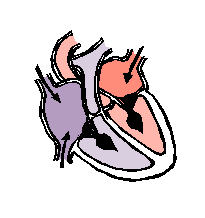Chelated Mega Minerals... Summary, Details
Meg-Epa-Caps... Summary, Details
Super B - Complex... Summary, Details
Fights Osteoporosis & Heart Disease
Contains:

Calcium - strengthen bones & teeth
Magnesium - help prevent heart attacks & high blood pressure
Zinc - optimal healing function, wound healing, vision
Selenium - quick repair of free radical damage to the DNA molecule
Iodine - essential for thyroid health, proper metabolism
![]() and much more....
and much more....
Chelated Mega-Mineral-Formula -
Fights Osteoporosis & Heart Disease
Calcium
Calcium is absorbed through your small intestine into your blood and the amount of calcium in your blood is regulated by your levels of parathyroid hormone. With adequate calcium intake, you produce less parathyroid hormone, so bone does not have to be broken down to provide calcium.
Magnesium
Magnesium is a cofactor for over 300 enzyme reactions in the body. It helps turn food into energy, keeps muscles from cramping, helps prevent heart attacks, high blood pressure, heart arrhythmia, asthma and kidney stones.
Zinc
Zinc appears in every body cell and is a component in over 200 enzymes. Adequate zinc levels are essential to good health, particularly to optimal immune function, wound healing, vision, male sexual function and skin health.
Potassium
Potassium functions in the maintenance of water balance and distribution, muscle and nerve cell function, heart function and kidney function.
Selenium
Selenium facilitates the quick repair of free radical damage to the DNA molecule.
Selenium appears to kill cancer cells before they replicate, thereby short-circuiting the generation of malignancy, tumor growth and cancer spread.
Chromium
Chromium is essential for carbohydrate control and insulin action and is a safe and extremely beneficial supplement for specific use in the treatment of diabetes, weight loss, and reduction of blood lipid levels.
Iodine
Iodine is essential for thyroid health, proper metabolism, endocrine system function. Iodine deficiencies have been linked to mental retardation and breast cancer.
Iron
An iron deficiency can cause pallor, hair loss, brittle nails, dizziness and anemia.
Manganese (Trace Mineral)
Manganese is vital for proper bone growth . It is recommended for lactation, diabetes, asthma, muscle and mental fatigue, epilepsy, PMS and digestion.
Phosphorous
It is essential for bone and tooth development, heart muscle contraction and proper kidney health. Good for tooth and gum disease, sterility, impotence, equilibrium, muscle disorders and bone formation.
![]()
1000 mg...
Essential Fatty Acids...
Give Your Body the EFAs it can't produce on its own!
Important For...
Regulation of blood pressure, heart function, gastrointestinal function, kidney function, blood clotting, nerve transmission and steroid production.
 Natural Fish Oil
Natural Fish Oil
Protect Against Heart Attack, High Blood Pressure, Stroke, Arthritis & Cancer
Ultra Potency Natural Fish Oil Concentrate supplying Optimum Percentage of Omega-3 Fatty Acids.....
Essential Fatty Acids Are Essential ....
While saturated fats have gotten a bad reputation—and rightly so—not all fats are bad. Certain unsaturated fats called essential fatty acids (EFAs) are vital to the functioning of your body. The membranes of every one of your cells are made of fatty acids. When there is a deficiency of EFAs in your diet, your cells must use other fats, such as saturated fats or trans fatty acids. Cell membranes made with these other fats are more rigid and less efficient at letting nutrients enter, which contributes to many health problems.
EFAs are also precursors to prostaglandins, hormone-like substances that are important to the regulation of blood pressure, heart function, gastrointestinal function, kidney function, blood clotting, nerve transmission, steroid production and hormone synthesis.
EFAs are made up of omega-3 (alpha-linoleic acid or LNA) fatty acids. Because your body can’t manufacture these fatty acids, it is important to supplement your diet with EFAs. This is especially true of omega-3 fatty acids, because we eat so few natural sources of omega-3 fats—cold-water fish oils and flax seed oil. Omega-3 oil supplements can reduce the incidence of high cholesterol, stroke, heart attack, angina, high blood pressure, rheumatoid arthritis and cancer.
By substantially increasing your intake of essential fatty acids, you can get a much more favourable ratio of polyunsaturated fats to saturated fats. This can have long-lasting and often dramatic health benefits. Fish and flax seed oils are an important source of omega-3 fatty acids—eicosapentanoic acid (EPA) and dodecahexanoic acid (DHA).
For healthy adults, 1,000 mg of fish oil is recommended (with 180 mg EPA and 120 mg DHA) omega-3 fatty acids.
If you have heart disease or lipid disorders or are diabetic, discuss EFAs with your physician before taking them.
![]()
|
Improves brain function & lowers stress levels | |
|
Prevent heart disease by lowering homocysteine levels! |
Helps with:
|
Detoxification | |
|
Nerve Functioning | |
|
Adrenal Function (Anti-Stress) | |
|
Energy Production & more... |
Super B-Complex -

Prevent Heart Disease by Lowering Your Homocysteine Levels!
Improves Brain Function & Lowers Stress Levels
The B Vitamins.... The B complex vitamins are essential for proper functioning of your nervous system, including proper mental functioning. In addition, they are necessary for metabolizing homocysteine.
You may not have heard much about homocysteine yet—but you will. Atherosclerosis (the accumulation of cholesterol and other deposits in your arteries) is actually initiated by homocysteine, a toxic byproduct of the conversion of the amino acid methionine into cysteine. When homocysteine builds up inside your cells and spills into the bloodstream, it damages arteries and reduces the integrity of vessel walls, laying the ground work for the accumulation of deposits and blockage of the arteries. Elevated homocysteine levels are likely responsible for 30% to 50% of the heart attacks and heart deaths that occur each year.
Vitamins B6 and B12 and folic acid play a crucial role in preventing the buildup of this toxic substance. Because of the interconnectedness of these three vitamins, the best approach to lowering homocysteine levels is to supplement all three.
B1 (thiamine) is essential for normal functioning of nerves, proper energy production in the brain and synthesis of a key neurotransmitter involved in memory.
B2 (riboflavin) is essential for energy production and in regenerating glutathione, one of the main cellular protectors against free-radical damage.
B3 (niacin) is an antioxidant and is involved in the regulation of blood sugar and detoxification. It has been shown to exert a favourable effect on cholesterol levels.
B5 (pantothenic acid) is involved in energy production and is considered the “antistress” vitamin because of its importance for optimal adrenal function.
B6 (pyridoxine) is extremely important for the formation of proteins and structural compounds, neurotransmitters, red blood cells and prostaglandins. It is also critical in maintaining hormonal balance and proper immune function.
B12 (cyanocobalamin) plays a critical role in proper energy metabolism and immune and nerve function. It is essential to the manufacture and normal functioning of blood cells and production of nucleic acids which make up DNA. B12 also helps maintain proper mental functioning and mood. Only tiny doses of B12 are needed to experience its benefits, but it is essential that you get enough B12 daily.
Folic Acid. Even though folic acid is not a B vitamin, it functions together with vitamin B12, and is one of the most important of these water-soluble nutrients. Like B12, it is a methyl donor that reduces homocysteine and its damaging effects. Folic Acid deficiency is the most common vitamin deficiency in the world. Studies have demonstrated that it is difficult to get an adequate amount of folic acid from food alone and the folic acid obtained from food is only 50% absorbed. As a supplement, however, folic acid is 100% absorbed.
Taking 400 mcg of supplemental folic acid, along with vitamins B6 and B12 will substantially reduce our homocysteine levels. This amount of folic acid is especially important for women of child-bearing age to guard against one of the worst tragedies a new mother can face—giving birth to a child with spina bifida or other neural tube defects. Only folic acid taken as a supplement has been shown to substantially reduce this risk.
![]()
protect against:
|
heart disease | |
|
free radical damage | |
|
improves blood flow | |
|
cancer and much more... |
Natural Vitamin E available in one capsule (D-'Alpha Tocopherol Acetate)
Vitamin E-400 I.U. Complex -

Protect Against Heart Disease & Free Radical Damage
Natural Vitamin E Available In One Capsule
(D'Alpha Tocopherol Acetate)
Vitamin E.....Vitamin E is a family of compounds called tocopherols that work together to protect you against the damage from free radicals. Tocopherols are the liquid (oil) form of vitamin E and are comprised of alpha, beta, gamma and delta tocopherol. Until recently, it was thought that alpha, the most common and active form, was that most important tocopherol, but research has shown that the other forms of tocopherol also help fend off free radicals.
Today most of the news about vitamin E concerns the benefits of taking it in large doses. In one study, 400 to 800 I.U. daily reduced the incidence of coronary heart disease by 77%.
A recent European study found that low blood levels of vitamin E were far more predictive of health disease than high levels of blood cholesterol and high blood pressure. High cholesterol levels were predictive 29% of the time and high blood pressure 25% of the time, but a low blood level of vitamin E was predictive of a heart attack 69% of the time! In 1997, the American Heart Association hailed the discovery of vitamin E as one of the top ten developments related to heart health.
Vitamin E also gives the immune system a significant boost, as reported in a 1997 article in the Journal of the American Medical Association. Healthy volunteers, all over the age of 65, took vitamin E supplements for 235 weeks. Afterwards, tests showed that their immune systems were much more active.
Other studies have shown that vitamin E helps protect against cancer, improves blood flow in people who have severe pain when they walk because of clogged arteries and relieves leg cramps.
When taken along with vitamin C, it helps prevent cataracts. It also slows the progression of Parkinson’s disease and Alzheimer’s disease. And this is only a partial listing of the benefits of Vitamin E!
To get enough vitamin E from food alone, you would have to consume two quarts of corn oil and 22 cups of peanuts a day. Clearly, that isn’t possible or even advisable, given the high amount of fat you’d be ingesting at the same time. The only practical way to get the levels of vitamin E you need is through supplementation.
800 I.U of vitamin E per day is recommended, either as tocopherols (oil form) or tocopherols (powder form). There is some concern about toxicity, but no toxicity has been reported from even larger doses of vitamin E. In fact, in one study, 3,200 I.U of vitamin E—along with 3,000 mg of vitamin C per day—was used for years to treat patients in the early stages of Parkinson’s disease. No toxicity was reported and there was a significant slowdown in the progression of the disease.
Natural or Synthetic Vitamin E?.....Your body can tell the difference between natural and synthetic vitamin E, so you should try to take it in the natural form. Because natural vitamin E is identical to what your body makes and what is found in food, your body absorbs it better, and it stays in your system longer than synthetic E.
Natural vitamin E is made from vegetable oils, while synthetic vitamin E is made chemically. Synthetic vitamin E also often contains fillers that oxidize quickly and produce free radicals that cancel out the vitamin’s antioxidant powers.
You can differentiate between natural and synthetic vitamin E in supplements by looking for d-alpha-tocopherol. Dl-alpha-tocopherol (note the “l”) indicates a synthetic version. Look for supplements that have only the "d". Natural vitamin E is expensive, but it is the best, most effective form of Vitamin E.
![]()






